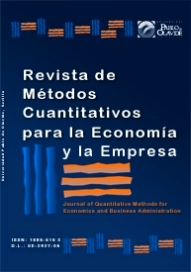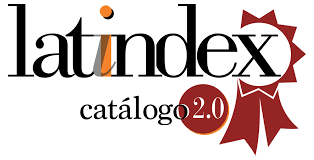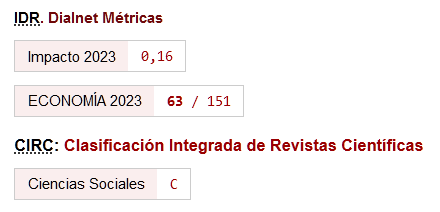Habilidades del desarrollador de software en la entrega a tiempo de proyectos
DOI:
https://doi.org/10.46661/rev.metodoscuant.econ.empresa.7840Palabras clave:
Competencias, habilidades, desarrollador de software, tiempo, calidadResumen
El propósito del estudio es analizar las habilidades de desarrollador de software en la entrega a tiempo de proyectos a través de la percepción de 308 empresas que han contratado el servicio en ésta área y se encuentran ubicadas en el área metropolitana de Monterrey. Se utilizó un instrumento de medición que está compuesto por 20 ítems, empleando un modelo multivariante de ecuaciones estructurales mediante la técnica de análisis factorial confirmatorio. Los datos fueron tratados con los paquetes estadísticos SPSS y AMOS, los resultados cumplen con el ajuste del modelo.
Descargas
Citas
Agrawal, M., & Chari, K. (2007). Software effort, quality, and cycle time: A study of CMM level 5 projects. IEEE Transactions on software engineering, 33(3), 145-156.
https://doi.org/10.1109/TSE.2007.29 DOI: https://doi.org/10.1109/TSE.2007.29
Balmelli, L., Brown, D., Cantor, M., & Mott, M. (2006). Model-driven systems development. IBM Systems journal, 45(3), 569-585.
https://doi.org/10.1147/sj.453.0569 DOI: https://doi.org/10.1147/sj.453.0569
Bano, M., Zowghi, D., Ikram, N., & Niazi, M. (2014). What makes service oriented requirements engineering challenging? A qualitative study. IET software, 8(4), 154-160.
https://doi.org/10.1049/iet-sen.2013.0131 DOI: https://doi.org/10.1049/iet-sen.2013.0131
Booneka, N., & Kiattikomol, P. (2008) Ranking Competencies for Software Developers in Thailand. Proceedings of the EDU-COM 2008 International Conference. Sustainability in Higher Education: Directions for Change,Edith Cowan University, Perth Western Australia, 19-21.
Cantú-Mata, J. L., Segoviano-Hernández, J., Penilla-Leal, R., & Zurita-Alarcón, R. D. J. (2014). Modelo estructural para evaluar las competencias del desarrollador de software. Revista Facultad de Ingeniería Universidad de Antioquia, (73), 90-100.
https://doi.org/10.17533/udea.redin.17298 DOI: https://doi.org/10.17533/udea.redin.17298
Cantú-Mata, J. L., Torres-Castillo, F., Alcaraz-Corona, S., & Banda-Muñoz, F. (2018). Calidad, tiempo y costo en proyectos de desarrollo de software. Interciencia, 43(10), 707-710.
Cedeño, M. C. V., Moreira, K. L. I., Chancay, M. T. M., & Franco, L. A. M. (2022). La competencia de trabajo bajo presión en la correcta administración de medicamentos por los profesionales de enfermería. REFCalE: Revista Electrónica Formación y Calidad Educativa, 10(1), 1-16.
Chaves, M. A. (2005). La ingeniería de requerimientos y su importancia en el desarrollo de proyectos de software. InterSedes: Revista de las Sedes Regionales, 6(10), 1-13.
Colomo-Palacios, R., Casado-Lumbreras, C., Soto-Acosta, P., García-Peñalvo, F. J., & Tovar-Caro, E. (2013). Competence gaps in software personnel: A multi-organizational study. Computers in Human Behavior, 29(2), 456-461.
https://doi.org/10.1016/j.chb.2012.04.021 DOI: https://doi.org/10.1016/j.chb.2012.04.021
de Jiménez, R. L. M. (2015). Metodologías ágiles de desarrollo de software aplicadas a la gestión de proyectos empresariales. Revista Tecnológica, 8, 6-11.
Farrell, A. M. (2010). Insufficient discriminant validity: A comment on Bove, Pervan, Beatty, and Shiu (2009). Journal of business research, 63(3), 324-327.
https://doi.org/10.1016/j.jbusres.2009.05.003 DOI: https://doi.org/10.1016/j.jbusres.2009.05.003
Sanz, L. F., & Silva, P. B. (2014). Risk management in software development projects in Spain: a state of art. Revista Facultad de Ingeniería Universidad de Antioquia, (70), 233-243.
https://doi.org/10.17533/udea.redin.13376 DOI: https://doi.org/10.17533/udea.redin.13376
Fornell, C., & Larcker, D. F. (1981) Structural equation models with unobservable variables and measurement error: Algebra and statistics. Journal of Marketing Research, 18 (3). 382-388.
https://doi.org/10.1177/002224378101800313 DOI: https://doi.org/10.1177/002224378101800313
Goles, T., Hawk, S., & Kaiser, K. M. (2008) Information technology workforce skills: The software and IT services provider perspective. Information Systems Frontiers. 10 (2), 179 - 194.
https://doi.org/10.1007/s10796-008-9072-9 DOI: https://doi.org/10.1007/s10796-008-9072-9
Grover, A. (2013) Business process outsourcing (BPO) in India: Growth and challenges. International Journal of Research in Economics and Social Sciences, 3(10), 51-61.
Hair, J. F., Ringle, C. M., & Sarstedt, M. (2011). PLS-SEM: Indeed a silver bullet. Journal of Marketing theory and Practice, 19(2), 139-152.
https://doi.org/10.2753/MTP1069-6679190202 DOI: https://doi.org/10.2753/MTP1069-6679190202
Javeed, F., Siddique, A., Munir, A., Shehzad, B., & Lali, M. I. (2020). Discovering software developer's coding expertise through deep learning. IET Software, 14(3), 213-220.
https://doi.org/10.1049/iet-sen.2019.0290 DOI: https://doi.org/10.1049/iet-sen.2019.0290
Kaiser, H. F. (1974). An index of factorial simplicity. Psychometrika, 39(1), 31-36.
https://doi.org/10.1007/BF02291575 DOI: https://doi.org/10.1007/BF02291575
Khan, A. W., & Khan, S. U. (2013). Critical success factors for offshore software outsourcing contract management from vendors' perspective: an exploratory study using a systematic literature review. IET software, 7(6), 327-338.
https://doi.org/10.1049/iet-sen.2013.0013 DOI: https://doi.org/10.1049/iet-sen.2013.0013
Levy, J. P., & Varela, J. (2006) Modelización con Estructuras de Covarianza en Ciencias Sociales. Netbiblo. La Coruña, España.
Licorish, S. A., & MacDonell, S. G. (2015). Communication and personality profiles of global software developers. Information and Software Technology, 64, 113-131.
https://doi.org/10.1016/j.infsof.2015.02.004 DOI: https://doi.org/10.1016/j.infsof.2015.02.004
Manteli, C., van de Weerd, I., & Brinkkemper, S. (2010) Bridging the gap between software product management and software project management. Proceedings of the 11th International Conference on Product Focused Software, ACM, 32-34.
https://doi.org/10.1145/1961258.1961266 DOI: https://doi.org/10.1145/1961258.1961266
Mata, J. L. C. (2017). Impacto de la inversión en outsourcing y el desempeño del desarrollador de software. Ingenierías, 20(76), 29.
Matturro, G., Raschetti, F., & Fontán, C. (2019). A Systematic Mapping Study on Soft Skills in Software Engineering. Journal of Universal Computer Science: J. UCS, 25(1), 16-41.
Niazi, M., Ikram, N., Bano, M., Imtiaz, S., & Khan, S. U. (2013). Establishing trust in offshore software outsourcing relationships: an exploratory study using a systematic literature review. IET software, 7(5), 283-293.
https://doi.org/10.1049/iet-sen.2012.0136 DOI: https://doi.org/10.1049/iet-sen.2012.0136
Prathan, S., & Ow, S. H. (2020). Determining the best‐fit programmers using Bayes' theorem and artificial neural network. IET Software, 14(4), 433-442.
https://doi.org/10.1049/iet-sen.2018.5440 DOI: https://doi.org/10.1049/iet-sen.2018.5440
Rauscher, T. G., & Smith, P. G. (1995). Time‐Driven Development of Software in Manufactured Goods. Journal of Product Innovation Management: An International Publication of the Product Development & Management Association, 12(3), 186-199.
https://doi.org/10.1111/1540-5885.1230186 DOI: https://doi.org/10.1111/1540-5885.1230186
Ríos, M. E. M., Golondrino, G. E. C., & Alarcón, M. A. O. (2022). Desarrollo de habilidades técnicas en ingeniería de software aplicando ingeniería inversa. Revista Boletín Redipe, 11(1), 534-550.
https://doi.org/10.36260/rbr.v11i1.1661 DOI: https://doi.org/10.36260/rbr.v11i1.1661
Orellana, B. J. S., & Portalanza, C. A. (2014). Influencia del liderazgo sobre el clima organizacional. Suma de negocios, 5(11), 117-125.
https://doi.org/10.1016/S2215-910X(14)70026-6 DOI: https://doi.org/10.1016/S2215-910X(14)70026-6
Sommerville, I. (2010) Software engineering, 9a ed. Addison Wesley Longman Publishing Co. Inc., USA.
Sukhoo, A., Barnard, A., Eloff, M. M., Van der Poll, J. A., & Motah, M. (2005) Accommodating Soft Skills in Software Project Management. Issues in Informing Science & Information Technology. 2. 691-704. DOI: https://doi.org/10.28945/860
https://doi.org/10.28945/2923 DOI: https://doi.org/10.28945/2923
Taborga, V., & Eduardo, C. (2013). Comparación de los modelos formativo, reflexivo y de antecedentes de evaluación estudiantil del servicio de docencia. Revista de Métodos Cuantitativos para la Economía y la Empresa, 16, 95-120.
Descargas
Publicado
Cómo citar
Número
Sección
Licencia
Derechos de autor 2024 Jose Luis Cantu - Mata

Esta obra está bajo una licencia internacional Creative Commons Atribución-CompartirIgual 4.0.
El envío de un manuscrito a la Revista supone que el trabajo no ha sido publicado anteriormente (excepto en la forma de un abstract o como parte de una tesis), que no está bajo consideración para su publicación en ninguna otra revista o editorial y que, en caso de aceptación, los autores están conforme con la transferencia automática del copyright a la Revista para su publicación y difusión. Los autores retendrán los derechos de autor para usar y compartir su artículo con un uso personal, institucional o con fines docentes; igualmente retiene los derechos de patente, de marca registrada (en caso de que sean aplicables) o derechos morales de autor (incluyendo los datos de investigación).
Los artículos publicados en la Revista están sujetos a la licencia Creative Commons CC-BY-SA de tipo Reconocimiento-CompartirIgual. Se permite el uso comercial de la obra, reconociendo su autoría, y de las posibles obras derivadas, la distribución de las cuales se debe hacer con una licencia igual a la que regula la obra original.
Hasta el volumen 21 se ha estado empleando la versión de licencia CC-BY-SA 3.0 ES y se ha comenzado a usar la versión CC-BY-SA 4.0 desde el volumen 22.










